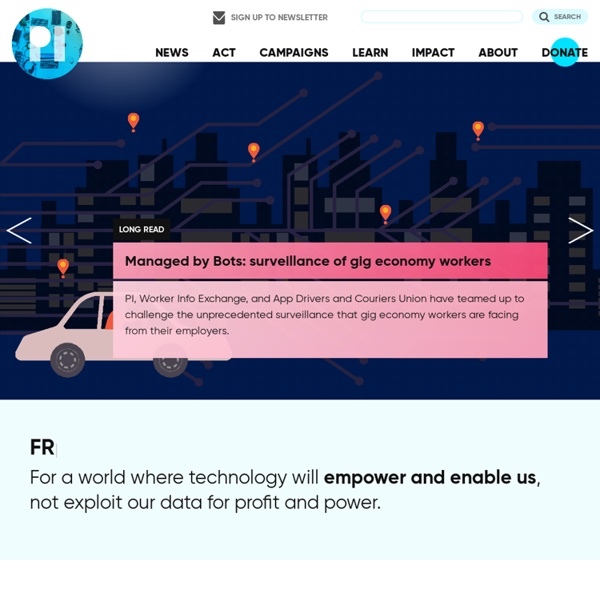



http://www.privacyinternational.org/
Related: Privacy & IDPrivacy and the Internet Log in or Become a Member Job Opening Research and Data Visualization Associate - National Journal for Atlantic Media See more openings on the FlowingData Job Board Data Underload Privacy and the Internet RawCap sniffer for Windows released ! ~ THN : The Hacker News RawCap sniffer for Windows released We are today proude to announce the release of RawCap, which is a free raw sockets sniffer for Windows. Here are some highlights of why RawCap is a great tool to have in your toolset:Can sniff any interface that has got an IP address, including 127.0.0.1 (localhost/loopback)RawCap.exe is just 17 kBNo external libraries or DLL's neededNo installation required, just download RawCap.exe and sniffCan sniff most interface types, including WiFi and PPP interfacesMinimal memory and CPU loadReliable and simple to useUsage RawCap takes two arguments; the first argument is the IP address or interface number to sniff from, the second is the path/file to write the captured packets to. C:\Tools>RawCap.exe 192.168.0.23 dumpfile.pcap You can also start RawCap without any arguments, which will leave you with an interactive dialog where you can select NIC and filename: RawCap Downloaded
When security matters Supported languages:English/United States of America (Germanic family)English (Germanic family) Time on your computer : 07:19:31Date on your computer : Wednesday, March 23, 2016Time got from the nearest GPS satellite : 23/03/2016 06:19:31 GMT Sites visited during this session : 2 Browser platform : Linux x86_64 How To Block Facebook's Face Recognition And Tighten Other Privacy Settings Facebook seems to be forever pushing the boundaries of what "online privacy" means. Today we see the latest iteration of this--Face Recognition. By adjusting its interface, Facebook has now enabled "tag suggestions" to many more of its users around the world, which means your friends will get an alert if someone uploads a photo that Facebook thinks contains your image. They'll be invited to tag it, and then your ID's associated with that image. Sounds neat in some ways, and there are a few privacy nods thrown in--Facebook notes that only friends can tag you, you'll get notified of the tag, you can remove tags and so on. But the system is actually turned on by default--which is Facebook's privacy boundary creep in action.
HOW TO: Get Your Data Out of Google One of the best things about the Internet and the proliferation of social media and cloud computing services is that more and more information is tied to a server — not an individual device. That means you can easily access your e-mail, calendar and contact lists while away from home. Instead of having to carry your photos with you, you can just open up Flickr or Facebook when you want to show off some shots to friends or family members. The downside is that getting information out of one online service provider and onto another (or just archiving for your own benefit) is often difficult or impossible. Google, a company that stores lots of data for lots of people, today announced the Google Data Liberation Front.
Zuckers! Facebook Has Secretly Been Giving User Info to Cops - Technology We've told you before that Facebook treats its users like products. That companies now exist to search for your Facebook account and tell your bosses your secrets. That people are quitting Facebook en masse. Now, there's yet another reason you might want to make the switch to Google+: Facebook has gotten into the habit of allowing police to scour users' profiles without their consent. According to a new report from Reuters and Westlaw, federal judges have granted at least 24 search warrants since 2008 allowing law enforcement officials to snoop around people's Facebook accounts.
Annotated.js For large, complex Javascript applications or libraries, Annotated.js provides a language extension for expressing the structure & validity of your code. By annotating your regular Javascript code, the Annotated.js runtime provides additional language features like declarative namespaces, class and module macros, and runtime type testing. Runs directly in the browser, even in external sources - what you see in the IDE is what you get in your browser's debug session.